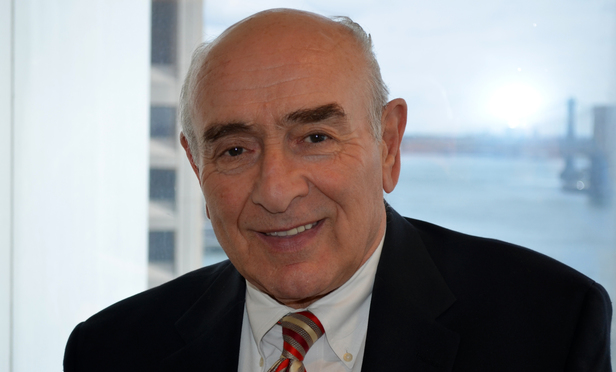Michael Hoenig

August 08, 2017 | New York Law Journal
Class Arbitration: Who Decides, The Arbitrator or the Court?In his Complex Litigation column, Michael Hoenig writes: The preemptive effect of valid arbitration agreements to preclude lawsuits in court, even class actions via arbitration clause class action waivers, has been reinforced by the U.S. Supreme Court time and again in recent years. But, what if there is an arbitration clause in the contract and the provision is silent about class arbitration? Is it an issue the arbitrator can decide or is viability of class arbitration an issue for a court to decide? That question was decided by the Eighth Circuit on July 28 as an issue of first impression in that circuit.
By Michael Hoenig
9 minute read

July 07, 2017 | New York Law Journal
SCOTUS Speaks on 'Specific' JurisdictionIn his Complex Litigation column, Michael Hoenig analyzes the Supreme Court's recent decisions on general and specific jurisdiction, which must be regarded by litigators and courts as pivotal rulings going to the heart of a state court's ability to adjudicate a case.
By Michael Hoenig
8 minute read

June 09, 2017 | New York Law Journal
SCOTUS Speaks on General Jurisdiction, Hague Service, and Arbitration ClausesComplex Litigation columnist Michael Hoenig writes: In case readers haven't noticed, the U.S. Supreme Court has been busy issuing recent rulings that can affect litigation practice. In the last month, the justices issued a significant decision rejecting general jurisdiction over a defendant in a state where that defendant was neither incorporated nor headquartered; held that service of process of a foreign defendant by mail is permitted by the terms of the Hague Service Convention, provided the foreign country has not objected to such service by mail; and ruled that a nursing home's arbitration agreement had to be enforced as preempting tort claims for injuries filed in Kentucky courts.
By Michael Hoenig
8 minute read

May 05, 2017 | New York Law Journal
U.S. Supreme Court Speaks on Discovery SanctionsAlthough the Supreme Court's decision in 'Goodyear' mandates that a court's award of monetary discovery sanctions must be causally-proportional to the misbehavior, it also may stimulate a rush by some litigators to assert so-called "discovery tort" claims, even after settlements are believed to have ended the litigation.
By Michael Hoenig
18 minute read

April 07, 2017 | New York Law Journal
PowerPoints and Other Persuasion ToolsComplex Litigation columnist Michael Hoenig discusses the recent Court of Appeals holdings on jury presentations, writing that the boundary lines drawn by the court are broad enough so they don't stifle or handcuff lawyer creativity but they are sufficiently admonitory to put trial counsel and judges on notice that prejudice must be avoided and, if unfairness seeps into the case, it must be cured promptly and effectively.
By Michael Hoenig
14 minute read

March 10, 2017 | New York Law Journal
Experts' Proofs Flunk N.Y. 'Reliability' StandardsIn his Complex Litigation column, Michael Hoenig writes: An important decision issued in February by the First Department tees up a grand refresher course on New York's legal standards for admitting expert testimony in toxic tort litigation.
By Michael Hoenig
18 minute read

February 08, 2017 | New York Law Journal
Improper Argument at Trial: Scrutinizing Counsel's ConductComplex Litigation columnist Michael Hoenig writes that with current levels of docket congestion, a proliferation of multi-party cases and some tendencies towards lengthier trials, the problem of reluctance to grant a mistrial has worsened—which can leave improper and prejudicial arguments unpunished.
By Michael Hoenig
33 minute read

January 20, 2017 | New York Law Journal
Guarding Against Improper Argument at Trial: Courts, Counsel Are InstrumentalComplex Litigation columnist Michael Hoenig writes: That courts exercise heightened vigilance in criminal cases when prosecutorial arguments cross the lines of prejudice should not be surprising. The strong court response to inflammatory comments in the recent 'People v. Brisco' criminal case had me wondering whether courts generally tend to exercise the same degree of vigilance and firepower in civil trials. It seems that, while ample lip service is paid by courts to established high-road principles, each case, so to speak, sits on its own bottom and outcomes are not predictable with certainty.
By Michael Hoenig
31 minute read

November 14, 2016 | New York Law Journal
Liability Exposure When Experts FlubComplex Litigation columnist Michael Hoenig explores questions relating to experts when they make mistakes or are found unreliable, including: If a claim has been thrown out because an expert botched his assignment or because the expert was found unreliable in key areas, does that open the expert to being sued for professional malpractice, negligence or breach of contract? In turn, could permitting such a claim expose the lawyers who retained that expert to direct suit by frustrated clients or to third-party claims by experts who are sued by losing litigants?
By Michael Hoenig
24 minute read

October 14, 2016 | New York Law Journal
Judicial 'Gatekeeping' of Experts Has ImpactComplex Litigation columnist Michael Hoenig brings to light an article examining the results of two sizable studies gauging the relative effectiveness of Daubert motions challenging the reliability of proffered experts. 'Daubert v. Merrell Dow Pharmaceuticals' ushered in a robust era of judicial "gatekeeping" and required that scientific expert testimony had to be "not only relevant but reliable."
By Michael Hoenig
18 minute read
Trending Stories
- 1Elon Musk Names Microsoft, Calif. AG to Amended OpenAI Suit
- 2Trump’s Plan to Purge Democracy
- 3Baltimore City Govt., After Winning Opioid Jury Trial, Preparing to Demand an Additional $11B for Abatement Costs
- 4X Joins Legal Attack on California's New Deepfakes Law
- 5Monsanto Wins Latest Philadelphia Roundup Trial
More from ALM
- Legal Speak: GCC East Comes to New York 1 minute read
- Legal Speak: A Convicted Felon is Coming to the White House. What Happens Now? 1 minute read
- Leveraging Partner Training To Recruit and Retain 1 minute read



